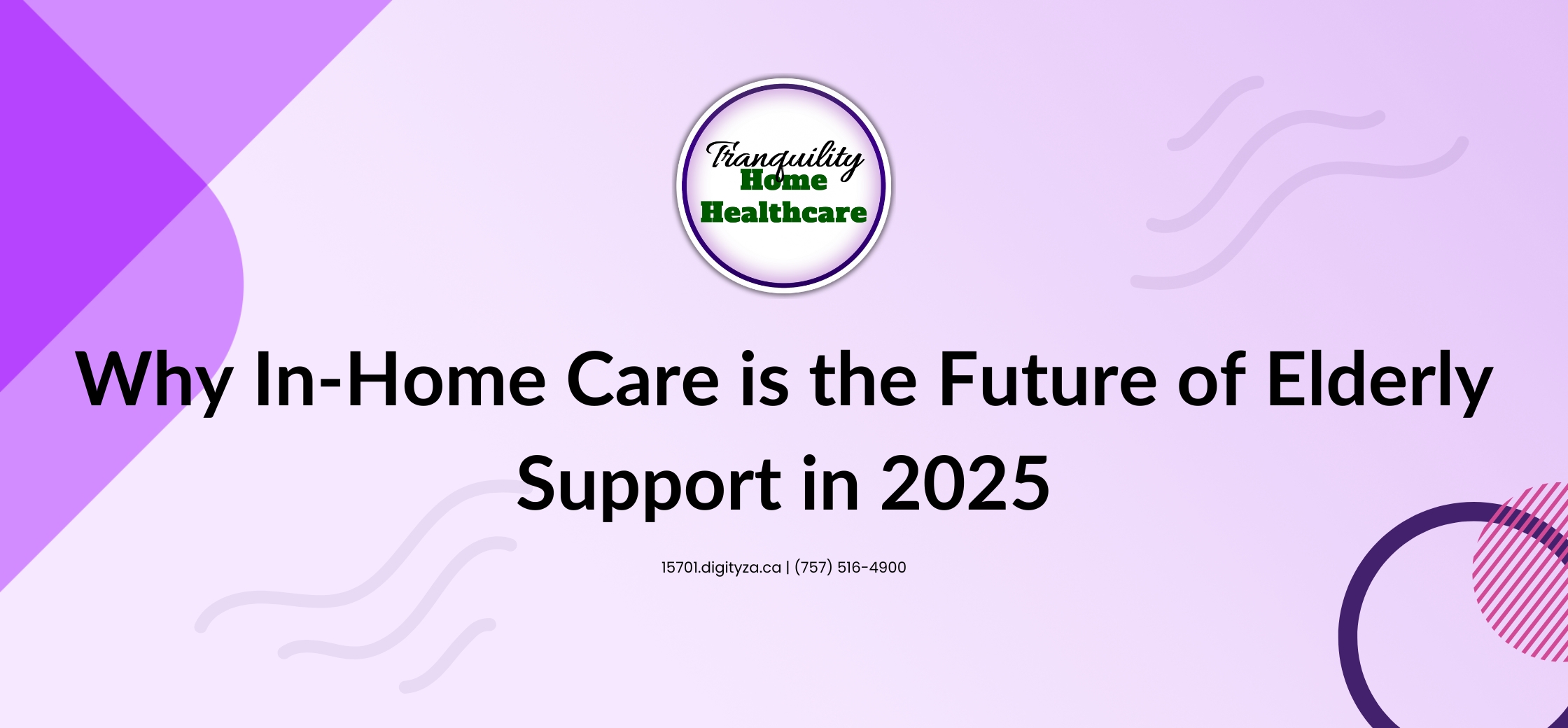Why In-Home Care is the Future of Elderly Support in 2025
As we move into 2025, the landscape of elderly support continues to evolve. With advancements in medical technology, changing family dynamics, and a growing preference for aging in place, in-home care is becoming the leading choice for senior care. More seniors are choosing to stay in their homes rather than transitioning to nursing facilities, thanks to the personalized and flexible nature of in-home care. In this blog, we’ll explore why in-home care is poised to be the future of elderly support and how it benefits seniors.
The Shift Toward In-Home Care
In-home care allows seniors to receive the necessary support in a familiar environment, making it a highly attractive option. Unlike assisted living or nursing homes, in-home care services are tailored to meet individual needs, enabling seniors to maintain a sense of independence while staying connected to their community. This shift is driven by several factors:
1. Growing Demand for Personalized Care
Seniors have unique needs that can be better met through personalized care plans. In-home care offers a level of customization that facilities often can’t match. Services range from personal care, like bathing and dressing, to more specialized medical support, such as medication management or physical therapy.
- Why it Matters: Personalized care helps improve seniors’ quality of life by addressing their specific health conditions and preferences.
- How it Works: Caregivers assess seniors’ needs and create a care plan that aligns with their daily routines, health requirements, and personal goals. Learn more about personalized in-home care.
2. Advancements in Technology for Elderly Care
Technology is playing a significant role in making in-home care more efficient and effective. Devices like wearable health monitors, telehealth services, and fall detection systems enable caregivers to provide real-time support while keeping seniors safe at home.
- Why it Matters: Technological support enhances safety, promotes better health monitoring, and provides peace of mind for both seniors and their families.
- How it Works: Caregivers can use technology to monitor vital signs, manage medication schedules, and ensure that seniors receive timely medical attention when needed.
Benefits of In-Home Care for Seniors
In-home care offers several advantages that make it a preferred choice for seniors and their families. Here are some of the key benefits:
1. Comfort of Familiar Surroundings
Seniors often feel more comfortable and secure in their own homes. Familiar surroundings can help reduce confusion, anxiety, and stress, particularly for those with memory-related conditions like dementia.
- Why it Matters: Remaining at home promotes mental well-being and provides a sense of security, which is crucial for aging comfortably.
- How it Works: Caregivers adapt care routines to fit into the senior’s home environment, making the transition to receiving support smoother. Explore how in-home care supports aging in place.
2. Flexible Care Options
One of the biggest advantages of in-home care is its flexibility. Services can be adjusted based on changing needs, allowing for more or less care as required. Whether it’s hourly visits or full-time support, in-home care provides the right level of assistance at the right time.
- Why it Matters: Flexibility in care options ensures that seniors receive the appropriate level of support as their needs evolve.
- How it Works: Caregivers provide a wide range of services, from light housekeeping and meal preparation to medical care, ensuring that seniors’ needs are always met.
3. Improved Health Outcomes
In-home care often leads to better health outcomes. With personalized attention and regular monitoring, seniors are less likely to experience complications that may arise from neglected health conditions. Caregivers can also assist with medication management, meal planning, and physical activity, all of which contribute to improved health.
- Why it Matters: Consistent and personalized care helps prevent hospital readmissions and promotes faster recovery from illnesses or surgeries.
- How it Works: Caregivers offer regular check-ins and health assessments to ensure seniors maintain their physical well-being. Find out more about elderly assistance services.
Why In-Home Care is the Preferred Choice for 2025
The preference for in-home care is more than just a trend; it’s a practical response to the changing needs and desires of the aging population. Here’s why in-home care is the future of elderly support:
1. Cost-Effectiveness
Compared to nursing homes or assisted living facilities, in-home care is often more cost-effective. Seniors and their families can choose the level of care that suits their budget, from occasional visits to full-time support. Additionally, in-home care helps prevent hospitalizations, which can be costly and disruptive.
- Why it Matters: Affordable care options allow seniors to access the support they need without overwhelming financial stress.
- How it Works: Families can work with care agencies to create a care plan that fits within their budget while ensuring seniors receive essential services. Explore more about in-home care.
2. Greater Family Involvement
In-home care allows family members to stay closely involved in their loved one’s care. This level of involvement can be reassuring for both seniors and their families, as it fosters better communication, stronger relationships, and more consistent monitoring of health.
- Why it Matters: When families are actively involved in care, it improves coordination, communication, and overall outcomes.
- How it Works: Caregivers collaborate with family members to ensure that seniors’ needs are being met and that the care plan aligns with the family’s expectations. Learn more about personalized care options.
The Future of Elderly Support
As we move further into 2025, in-home care continues to be a leading choice for elderly support. Its personalized, flexible, and cost-effective nature makes it the ideal option for seniors who wish to age comfortably in their own homes. With advancements in technology and a focus on individual needs, in-home care is the presentand the future of elderly support.
If you’re considering in-home care for a loved one, reach out to Tranquility Home Health Care. Our caregivers are dedicated to providing personalized, compassionate care that supports seniors’ independence and well-being.

